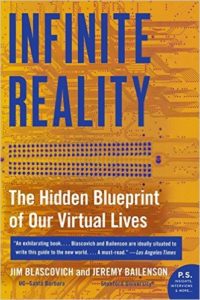 What We’re Reading:
What We’re Reading:
Infinite Reality:The Hidden Blueprint of Our Virtual Lives, by Jim Blascovich and Jeremy Bailenson.
While five years old, this book is a dated descriptor of where Virtual Reality is today as a technology, but it is as good as has been found as a descriptor of the linkage between VR and its effect on us as human beings. It was good background for writing “Illusory Objectives.” Even ordinary media have made a few mortals into immortal, seemingly live people.
For example, Orville Redenbacher died in 1995, but his avatar lived on in advertising, speaking to us as if he were still alive. Ads using his avatar aired in 2007. They were pulled because too many viewers saw through the ruse and referred to him as Orville Deadenbacher. With the newest technology fewer people might be fooled.
From there, the authors dive into the issue of what is real and what is not, reviewing centuries of insight that everything we see is a hallucination, an image in our minds. We attempt to test whether an image is real — if we care enough to do so. Art and entertainment attempt to make us suspend our disbelief. Whole industries are now based on this suspension. The authors call this psychological relativity, perhaps as mind blowing as Einstein’s theory of relativity in physics.
Virtual reality is advancing the sensory fidelity of touch and smell as well as vision. Blascovitch projects that distinguishing reality from illusion will become more and more difficult. Perhaps it will seem so real that we will take virtual vacations all around the world without physically going anywhere, or spend a night with anybody of our pleasing like our very own https://www.fulltube.xxx/ movie all by ourselves.
Blascovich and Bailenson opine that virtual reality will shatter many assumptions about human nature, and likely become an influence on society more powerful than anything that has come before. Virtual reality has the potential to “rewire human minds.” Will we connect human brains so closely with computer brains that we ourselves can’t recognize the interface? (If you can control a computer just by thought, can the computer in turn control your thought?)
Will traditional concepts of self and others cease to have meaning? What will be the moral code? Legal codes lag way behind technological change. Virtual, adaptable religion still sounds like heresy, but how much longer?
As virtual reality becomes ubiquitous, society will have to adapt — if it can. VR can be used for “good or evil,” but which gains the upper hand seems to be an existential issue for humanity.

